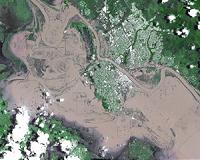 |
Sydney (AFP) Feb 9, 2011 Australia said Wednesday carbon emissions will rise more than predicted by 2020 in the world's biggest per capita polluter, blaming its Asian-led mining boom. The climate change department predicted Australia's emissions will surge by as much as 24 percent by 2020 compared to 2000 levels, four percent higher than last year's projections. "Growth to 2020 is dominated by emissions associated with the extraction and processing of energy resources driven by strong export demand," the department said in its annual emissions report. "Fugitive emissions from coal mines and oil and gas projects, as well as direct fuel combustion emissions from LNG projects, account for almost half of the growth in Australia's total emissions from 2010 to 2020." The report found Australia was on track to reduce emissions to 106 percent of 1990 levels by 2012, two percent lower than its target agreed under the Kyoto protocol. But it also said total emissions would grow 1.8 percent annually over the coming decade, compared with 0.4 percent since 2000. By 2030 the report said emissions could be 44 percent above 2000 levels, though it cautioned this was a less reliable prediction. Australia is the world's worst per capita polluter and home to its biggest coal export port, shipping millions of tonnes of energy and steelmaking coal to Asian markets annually, as well as iron ore and other minerals. It is also heavily dependent on coal-fired power stations for electricity, a sector the report said accounted for 36 percent of Australia's total emissions in 2010. Direct fuel combustion and agriculture each contributed about 15 percent and transport was the third biggest, at 14 percent. The energy sector had spurred most of the emissions growth since 1990, "driven by Australia's relatively high rates of economic growth and international demand for Australia's resources," it added. But renewable energy incentives would see growth in electricity-related pollution slow to just six percent over the next decade, the report said. Meeting its reductions targets of between five and 25 percent offered after the Copenhagen climate summit would require "strong and concerted action on multiple fronts" in Australia, the report added. The Labor government abandoned an attempt to introduce a cap-and-trade carbon programme early last year. Prime Minister Julia Gillard supports charging for carbon emissions, but is still investigating how to price them.
Share This Article With Planet Earth
Related Links Powering The World in the 21st Century at Energy-Daily.com
 BHP says coal output fell 30% in Australia floods
BHP says coal output fell 30% in Australia floodsSydney (AFP) Jan 20, 2011 Devastating floods in Australia's Queensland state have slashed production of steelmaking coal by 30 percent in the resources-rich region, the world's biggest miner BHP Billiton said Thursday. But while the weather put the brakes on its coal production, the Anglo-Australian mining giant managed record iron ore output in the December quarter as demand for minerals boomed following the global ... read more |
|
| The content herein, unless otherwise known to be public domain, are Copyright 1995-2010 - SpaceDaily. AFP and UPI Wire Stories are copyright Agence France-Presse and United Press International. ESA Portal Reports are copyright European Space Agency. All NASA sourced material is public domain. Additional copyrights may apply in whole or part to other bona fide parties. Advertising does not imply endorsement,agreement or approval of any opinions, statements or information provided by SpaceDaily on any Web page published or hosted by SpaceDaily. Privacy Statement |